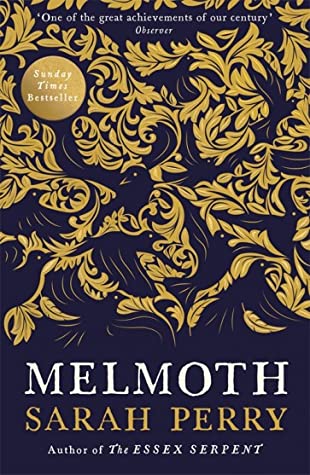Sarah Perry
A gothic and sombre novel about human suffering and the man’s inhumanity to man.

I was not familiar with the writing of Sarah Perry when I started this. I had picked up the book from a charity collection in a supermarket and the blurb on the back described a lost manuscript and various time periods including the turn of the century.
As a sucker for adventurous history such as Blood and Treasure or Indiana Jones I had picked up the dog-eared copy in exchange for a donation. I was not expecting an emotional reflection on my own life, which, if you decide to read, is what lies in store.
The novel centres on a a plain and nondescript woman named Helen living in Prague as a translator. Her circle of friends is small, almost forced, and her lifestyle is penitent-like. She is suddenly introduced to the titular character of Melmoth via a manuscript of eye witness accounts.
Melmoth is a legend dating from the time of Christ who wanders the earth with bloodied feet bearing witness to the crimes that man visits upon his own race and in doing so offers to free those living with guilt and shame if they just take her black-robed hand…
The story chronicles, not the lives of individuals who did actively commit atrocities, such as the SS camp guards in Auschwitz, but those that enabled the horrors. The person in the street who looks the other way or the informant who nudges a policeman to the address of a family. The bureaucrats who shuffle the paperwork that enables genocide and the bystanders who would watch innocent women burned at the stake.
I wonder, when God permitted us to fall, if He knew we’d fall so far.
Melmoth is the realisation that we are all complicit in the suffering of someone, somewhere. As Helen explores the manuscript her life in Prague becomes more surreal and her grip on sanity frays as apparitions follow her reminding her of her own guilt (which we learn of in the second act).
Sarah Perry is an undoubtedly skilled storyteller and she moves with ease between different characters and time-periods, varying her narrative style accordingly. The character of Melmoth is an homage to other Victorian novels with the same name but all are really variations of the real-life story of the Wandering Jew; a man cursed to walk the earth for insulting Christ as he laboured under his cross to be crucified.
Whilst the novel is short of true horror there are two definite beats in that are likely to shake the reader (if they have any heart at all). One revelation of Hassan and the Nameless is so skillful that I genuinely paused and spent time contemplating how masterfully she had pulled it off. The entire chapter was excellent with a beautifully succinct ending. To say more would spoil it.
I do recommend Melmoth but, honestly, it is not easy fare to read and the antagonist of the story never truly becomes more than a vague threat on the horizon. The true distress is caused by realising just how easily any of us could look the other way at human suffering or worse, justify it to ourselves.
In summary, an emotional and evocative story that may require you to put down the book and reflect deeply on certain chapters.